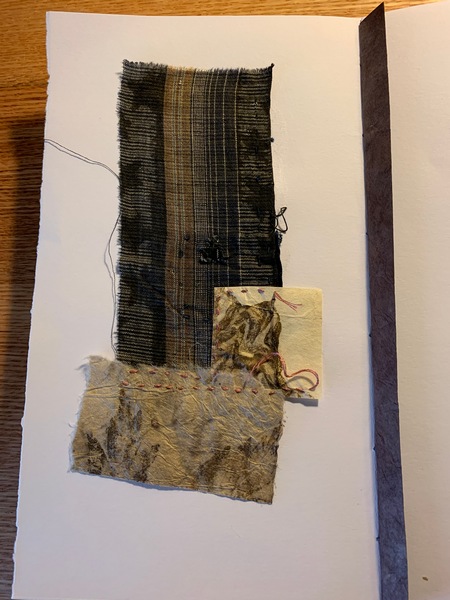
This morning walking back from the corner. My day started with the gym, grocery store and coffee on the corner with some fresh bran muffins.
Last Friday I had a delightful six hours with an old friend from the basket making world. I rescued a bunch of broccoli to make a nice creamy/cheesy soup to serve with my latest spinach scones for lunch before picking her up and bringing her home. Judy comes into the area once a year to teach and this was the first time she has seen my new home. Lots of chatting, finishing with a couple of scotches before I took her back. This Wednesday another visitor from the before is coming to visit. A student in several classes over the years is back in town taking another workshop and wanted to visit. I am excited to catch up with her.
In the studio the past few days I have been working on the latest book with basket samples inside. I finished up the double page drawings of a way to start a base.

A bit more writing with the sample…

Turn the page and start again…with some favorite materials of shifu threads and a tiny hammer I bought at a market in St. Andrews, Victoria while staying at Baldessin Press Studio.

I took all the spoke pieces and made an overhand knot in the center, then hammered it down to flatten. Next selected earth pigment colored shifu threads to weave the base. These threads were found in the bottom of Anna’s basket that I drew on the first page of this book. Again using a favorite tool from Wafu Works in Hobart, Tasmania. I used it for packing rows of weaving.
More writing and a window..

I was recalling that this group of basket makers in Tasmania used to mark off sections where the Native Hen had made deposits so I could rub papers to spin into colored threads later in the day.
So naturally I had to draw a Tasmanian Native Hen and put a couple scraps of the paper dyed with their beautiful green.

I never spun this sheet into thread…probably because dampening it brought back the smell. So now it is folded back up and stuffed with other threads made using Tasmanian soils for color back into Anna’s basket.
Speaking of earth pigments, Thursday evening a friend took me to the opening of another art exhibit at the nearby small liberal arts college. It made my heart soar to see such massive canvases encrusted with local pigments. It was appropriately titled, “Place”. The artist is a woman who seemed to share the same passion for marking place in this way. I was glad I took one of my Earth Pigments books to pass on to her. She was surprised and happy to have it. We will hopefully get together and talk more about the thrill of working with gathered color.
Friday we go back to visit classrooms and see what students are doing. I did meet a few of them at the opening and it made me feel good to see such energy and passion in another generation making art. Two of the men in my former art group have affiliations with this college and I hope to run into them again. Oh, to share a bottle with those two and hear what they have been up to these past few years….
A glass of Madeira I treated myself to remembering these favorites from art group.

Then yesterday I decided I needed to get back to Burke and Wills. Judy encouraged me to read some of my stories and show her what I was working on. After reading The Stoat Story, Down the Rabbit Hole, and others, it caused me to bring out the Burke and Wills drawings. This morning I did another that needs to be painted, and started another… hopefully the words will come to put it all together.

Here Wills is getting too big to fit in the house Boris and Belinda, the river rats, left them when they moved south. Not sure where they go next before ending up in the elderly care home.
I must say that it feels good to just lose myself in the lives of an owl and rabbit.
Til later….







































